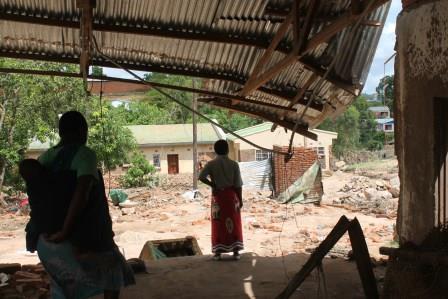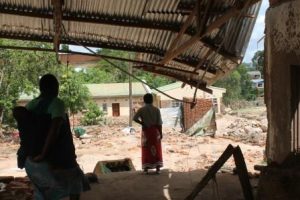Malawi Floods Cause Devastation

As Malawi is passing through what many believe is but the eye of the storm, the worst in a generation, the country is quickly coming to terms with the mammoth scale of the human and material loss of the recent flash floods.
Over 200,000 people were displaced and rendered homeless! Close to 200 were confirmed dead! And hundreds more are missing and yet to be found! And the counting is not yet over.
But one has to witness this firsthand–to appreciate what words like displaced, missing, and homeless really means. One has to stand amidst the rumble and despair to understand the anguish in the fact that the counting is not yet over.
That is what I did yesterday when two of my colleagues and I visited a government primary school in Chilobwe, a semi-urban area in Blantyre city, which is currently sheltering close to 300 flood victims.
When we walked into the deputy head-teacher’s office, unannounced, with our cameras, notepads, and pens, we received a querying look from the smallish woman, immaculately dressed in her Sunday best on a Wednesday morning. Her name is Charity.
When we introduced ourselves and stated the reason for our visit, Charity let out a mild chuckle and looked to her co-worker, another teacher seated next to her, as she gave a gesture of delegation – Charity was handing us over.
There was something about the chuckle I couldn’t understand at the time. Initially, I thought it was a form of polite dismissal, but it had a hint of something. Something deep.
Brushing this thought aside, the other teacher, a plumpish smiley woman in shaded glasses named Rita, walked us to the area where the floods had passed the previous week. As we stood, speechless, staring at the remains of an iron sheet roof hanging over what used to be a sitting room, Rita added, as if for dramatic effect, “There was never a ‘river’ here. The floods created this river and swept away 12 houses.”
As we walked through the rumble of collapsed mud houses and the water-swept grounds of places that once had homes, we could only walk in silence and I, with my camera in hand, felt completely ashamed of my task of having to take pictures of other people’s misery.
There were many harrowing stories we heard from that two-hour stroll through the indiscriminate chaos.
We witnessed children offering a helping hand to their overwhelmed parents by digging out wet pieces of charcoal from the mucky sand.
We saw an old man chipping away at his fence, carefully removing one brick at a time, to build another house away from the new ‘river’.
The stories were harrowing as there will be painfully many more to come.
As we walked back, each lost in thought, I engaged Rita in an aimless conversation, more to intentionally exorcise myself of what I had just seen, even for a moment. I can’t remember what I said or asked to warrant this interesting piece of information:
“Charity is also a victim,” Rita added. “She used to live where the ‘river’ is now!”
Then it all made sense! That was what I heard in her chuckle. It wasn’t a polite kind of dismissal or a poor attempt at mirth. It was a deep sense of grief at what she had lost. Deep and all-consuming grief! She handed us over to Rita because she didn’t want to relive that day again – who would want to?
Having seen the destruction for myself, I only wonder where she found the strength to come to work every day since. As we said goodbye and mounted our transport, I then realized why Charity was dressed so immaculately for a Wednesday morning. Maybe, probably, that was all she had left.
As we exited the school gates and returned to the safety of the city, I recalled something one of the women we interviewed said about her predicament. I can’t state everything she said in words, which makes me feel so small in the grand scheme of things.
Standing over her foamy laundry in the ‘river’, just a few meters downstream, we asked her how she felt about the disaster and how it changed her life.
Without a hint of emotion, she replied: “What else can I do? Life must go on.”
Yes! Life will go on, but it will never be the same again.

